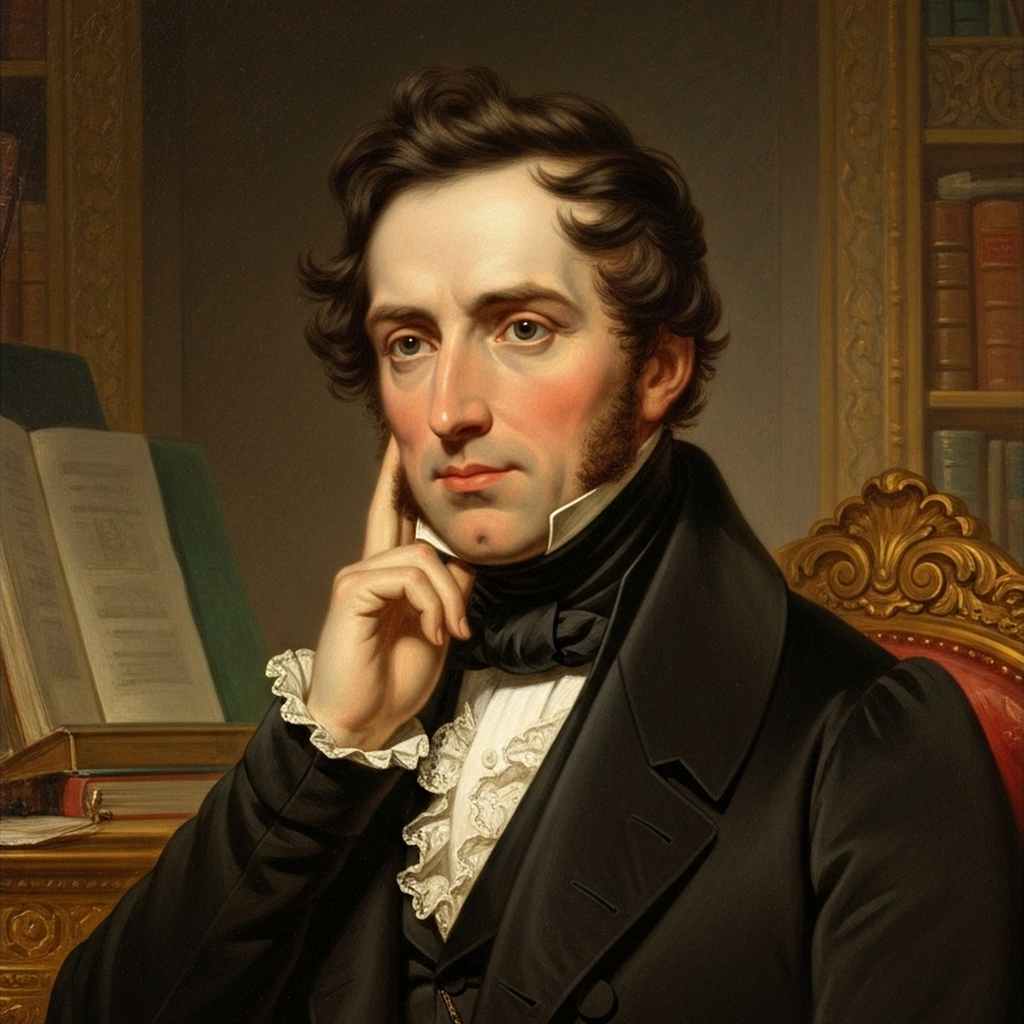1 Poems by Juliusz Słowacki
1809 - 1849
Juliusz Słowacki Biography
Juliusz Słowacki, one of the greatest poets of Polish Romanticism, occupies a vital place in the canon of Polish literature. His life and work are inextricably linked to the tumultuous political history of 19th-century Poland, a nation grappling with the loss of independence and the challenge of preserving its cultural identity under foreign occupation. Słowacki's poetic voice emerged as a beacon of hope, defiance, and introspection during an era of deep national crisis, and his legacy continues to resonate as a symbol of artistic innovation and unyielding patriotism.
Born on September 4, 1809, in the town of Krzemieniec (then part of the Duchy of Warsaw, now in Ukraine), Słowacki came into a family steeped in intellectual and literary tradition. His father, Euzebiusz Słowacki, was a distinguished professor of rhetoric and literature, while his mother, Salomea Bécu, nurtured his early love of reading and storytelling. The early death of his father when Juliusz was only five years old left a lasting impression on the young boy, fostering a sense of melancholy and loss that would later permeate his poetry. Salomea’s remarriage to August Bécu, a professor of medicine, brought financial stability but failed to provide the emotional intimacy young Słowacki craved, intensifying his sensitivity and detachment.
Słowacki’s education at the Krzemieniec Lyceum and later at the University of Vilnius exposed him to the intellectual currents of the Enlightenment and Romanticism. Vilnius, a vibrant cultural hub under Russian control, offered Słowacki an arena to encounter the works of European Romantic poets such as Byron, Schiller, and Goethe, as well as the burgeoning Romantic movement in Poland led by Adam Mickiewicz. This environment ignited his poetic ambition and cemented his commitment to exploring the interplay of personal emotion and collective national destiny.
In 1829, Słowacki moved to Warsaw, where he worked as a clerk in the Polish Ministry of Treasury. His brief tenure there coincided with the outbreak of the November Uprising (1830–1831), a rebellion against Russian domination. Although Słowacki did not actively participate in the fighting, the uprising profoundly influenced his imagination and ideology. In 1831, he left Poland under the pretext of a diplomatic mission, embarking on a period of self-imposed exile that would last for the remainder of his life.
Słowacki’s early poetry, written during his travels through Western Europe, reveals a tension between the Romantic ideal of freedom and the tragic realities of Poland's political fragmentation. His first published collections, Poezje (1832), contained lyrical poems marked by a Byronic introspection and patriotic fervor. Works such as "Hymn" ("Smutno mi, Boże") evoke a poignant sense of exile and alienation, juxtaposing personal sorrow with divine contemplation. These poems established Słowacki as a promising voice among the émigré community in Paris, although they were often overshadowed by the towering figure of Mickiewicz, his older contemporary and eventual rival.
Paris in the 1830s was a haven for Polish expatriates, and it was here that Słowacki began to refine his artistic vision and engage with the philosophical and spiritual dimensions of Romanticism. His dramatic works, including Kordian (1834), mark a significant development in his career. Kordian is a quintessential Romantic drama that explores the existential crisis of its titular hero, a young Polish idealist torn between his desire to liberate his nation and his feelings of inadequacy. Through Kordian’s internal struggle, Słowacki interrogates the limits of individual agency in a world shaped by historical forces, offering a complex critique of Polish Romantic messianism.
Exile afforded Słowacki not only freedom from political constraints but also an opportunity for extensive travel, which deeply enriched his poetic imagination. His journeys to Switzerland, Italy, Greece, and the Middle East infused his work with vivid imagery, exotic landscapes, and a profound sense of spiritual quest. His celebrated verse drama Balladyna (1839), a tale steeped in Polish folklore and Shakespearean tragedy, showcases his ability to blend universal themes of ambition, guilt, and redemption with the rich tapestry of Slavic cultural motifs. Similarly, his long narrative poem Beniowski (1841) blends biting satire with a Romantic celebration of adventure and individuality, demonstrating Słowacki’s growing mastery of irony and formal experimentation.
While Słowacki’s early works were steeped in Romantic conventions, his later poetry reveals a bold departure into mysticism and philosophical speculation. Influenced by the writings of Swedenborg and his own spiritual experiences, Słowacki developed a metaphysical worldview centered on the concept of "genealogy of the spirit." He believed that humanity was engaged in a continuous process of spiritual evolution, with poets and visionaries acting as intermediaries between the divine and the earthly realms. This vision found its fullest expression in works such as Anhelli (1838) and Genezis z Ducha (1844), which combine allegory, prophecy, and esoteric symbolism to articulate a cosmic vision of history and human destiny.
Despite his spiritual convictions, Słowacki was not immune to the personal struggles of exile. His relationships with his fellow émigrés were often fraught with tension and misunderstanding, particularly with Mickiewicz, whose own mystical philosophy clashed with Słowacki’s ideas. These rivalries, however, spurred some of Słowacki’s most compelling works, as he sought to assert his unique voice within the Romantic tradition. His correspondence and poems from this period reveal a profound longing for recognition and a deepening sense of isolation.
In his final years, Słowacki returned to themes of national liberation and collective sacrifice, channeling his energies into fostering a vision of Poland’s spiritual and political renewal. His unfinished epic poem Król-Duch (King-Spirit) represents the culmination of his philosophical and artistic journey, blending history, mythology, and metaphysics into a sweeping meditation on the interplay of human will and divine providence. Although the poem’s complexity and fragmentary nature baffled many of his contemporaries, it has since been recognized as a landmark of Polish literature, emblematic of Słowacki’s relentless pursuit of artistic and intellectual innovation.
Słowacki died on April 3, 1849, in Paris, succumbing to tuberculosis at the age of 39. His death marked the end of a life marked by profound creativity and unfulfilled longing, yet his influence endured, shaping successive generations of Polish poets and thinkers. Today, Słowacki is celebrated not only for his literary achievements but also for his role as a cultural icon who articulated the aspirations and tribulations of a nation in search of its identity. His poetry, characterized by its linguistic brilliance, emotional depth, and philosophical daring, continues to inspire readers with its timeless exploration of the human condition.
This text was generated by AI and is for reference only. Learn more
Username Information
No username is open
Everything is free to use, but donations are always appreciated.
Quick Links
© 2024-2025 R.I.Chalmers (V2Melody).

All music on this site by R.I.Chalmers (V2Melody) is licensed under a Creative Commons Attribution-NonCommercial 4.0 International License.
Attribution Requirement:
When using this music, you must give appropriate credit by including the following statement (or equivalent) wherever the music is used or credited:
"Music by R.I.Chalmers (V2Melody) – https://v2melody.com"
Support My Work:
If you enjoy this music and would like to support future creations, your thanks are always welcome but never required.
Thanks!


